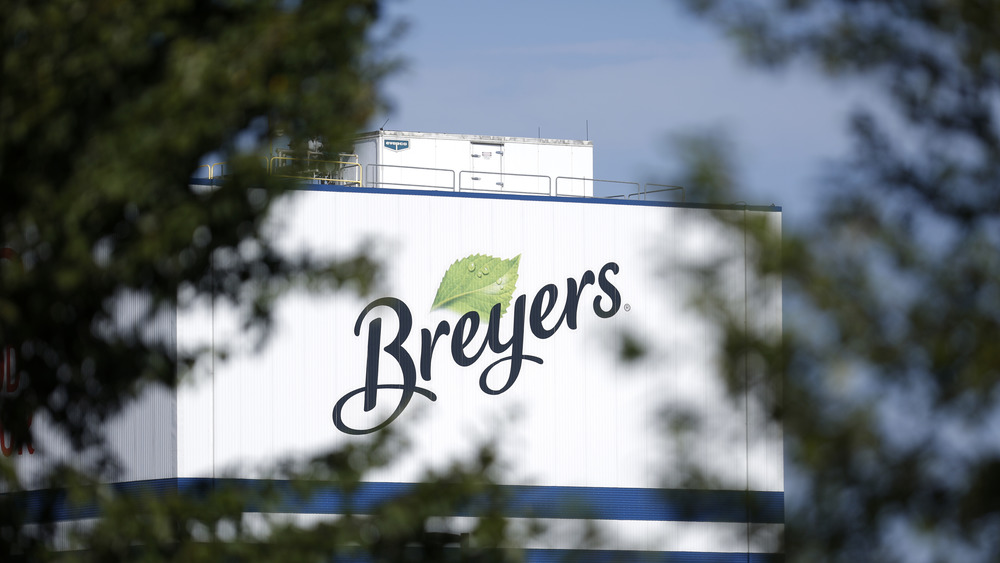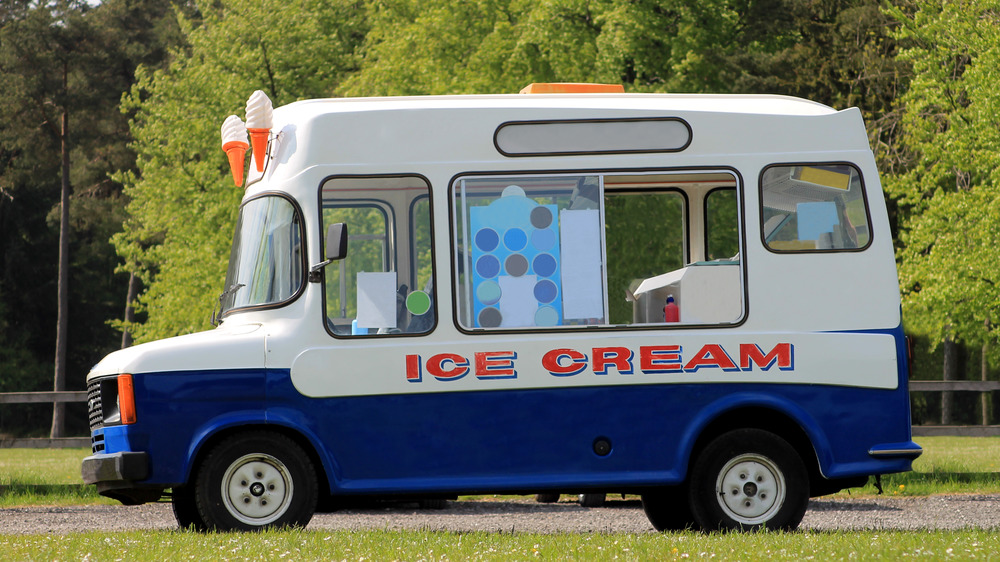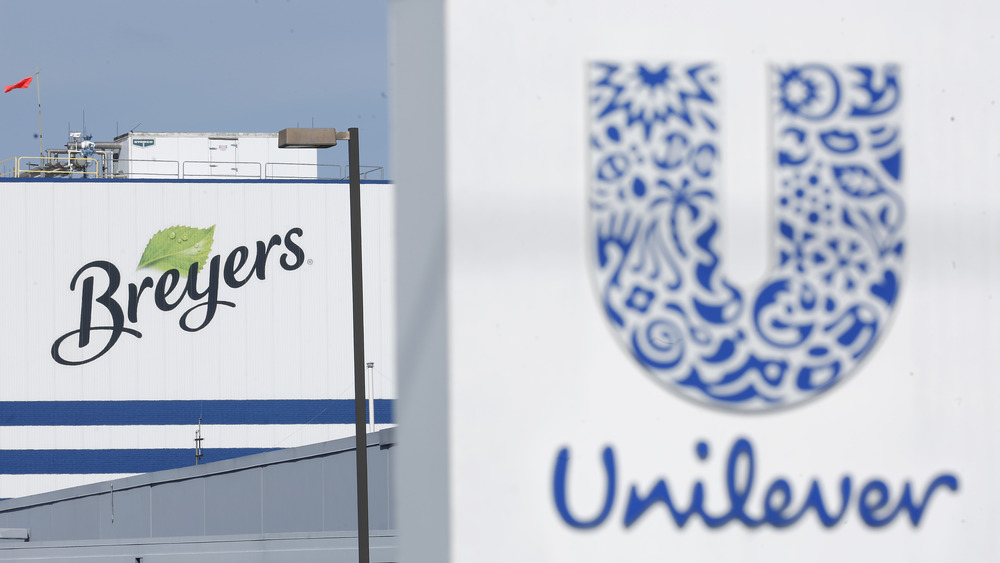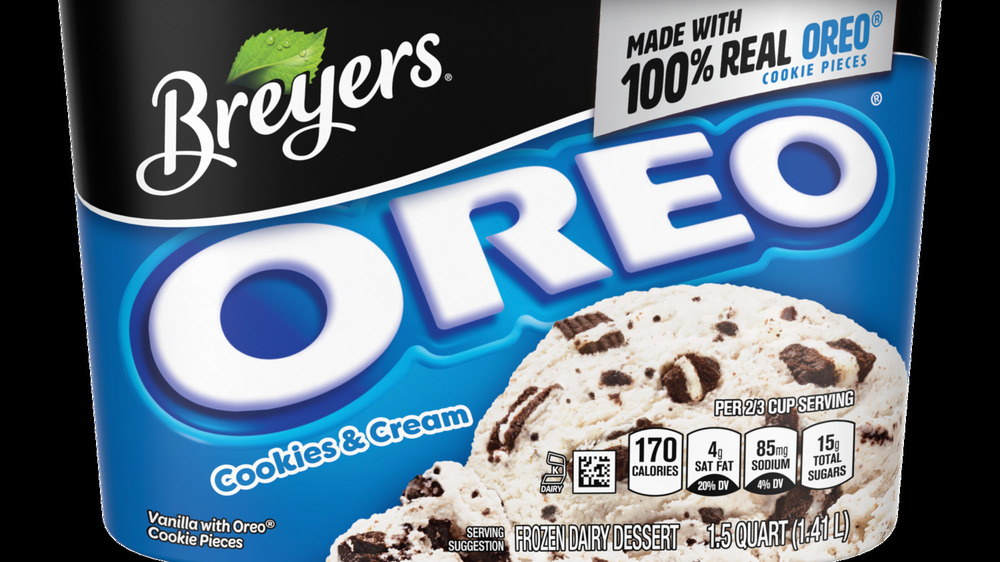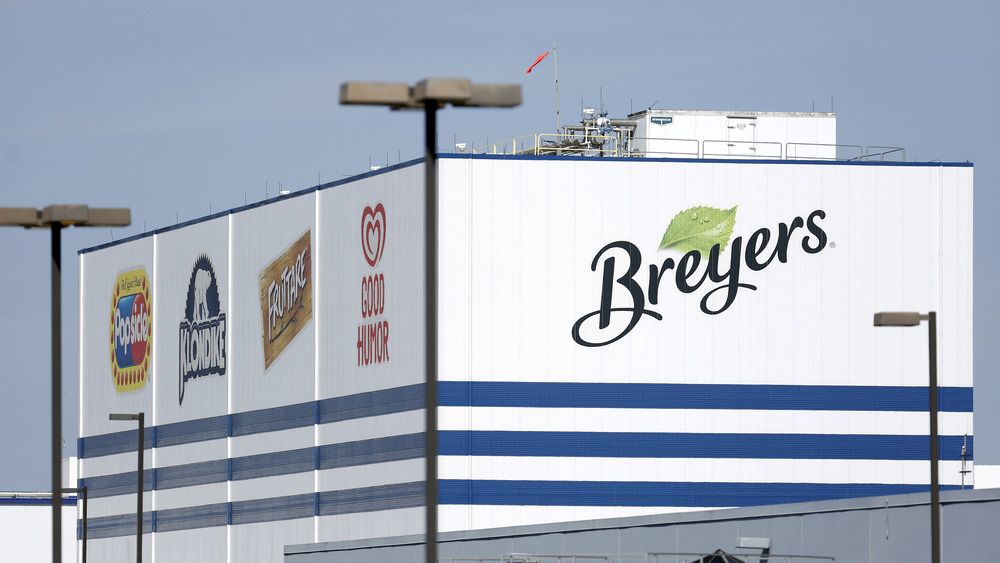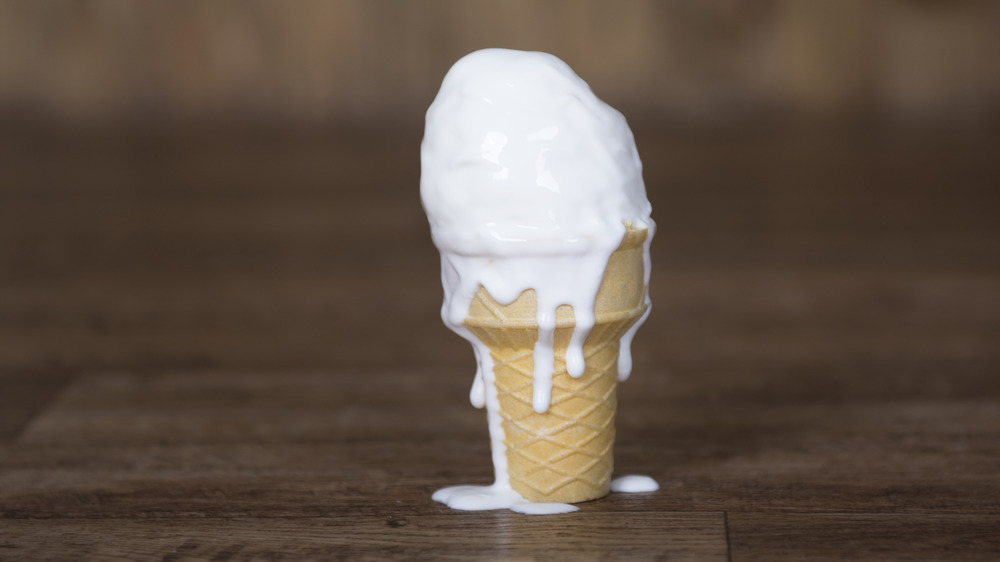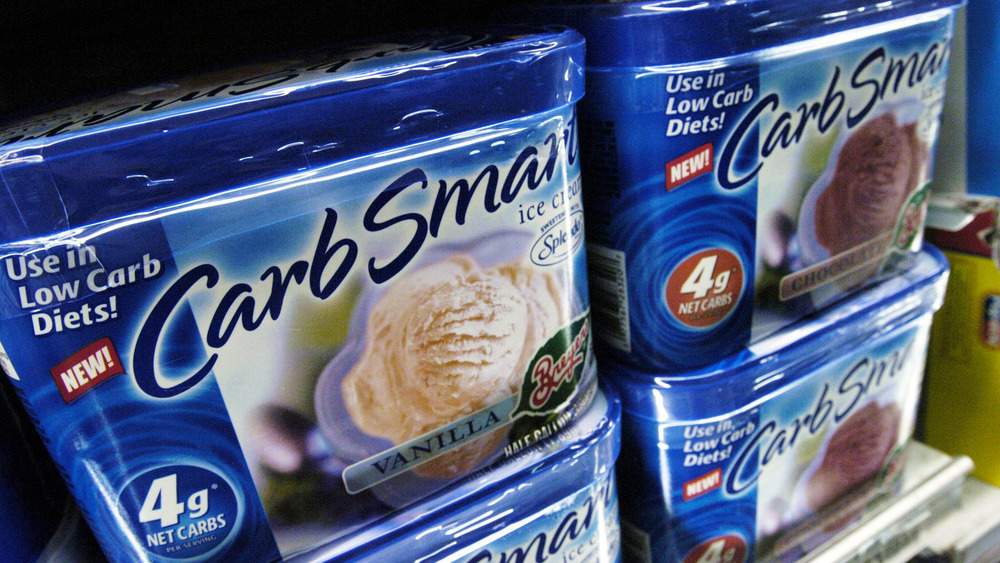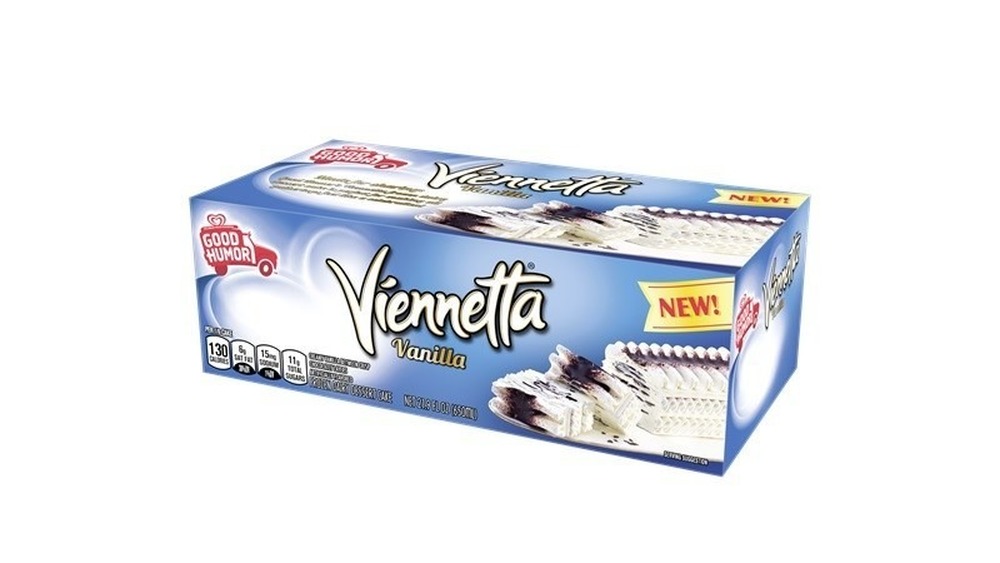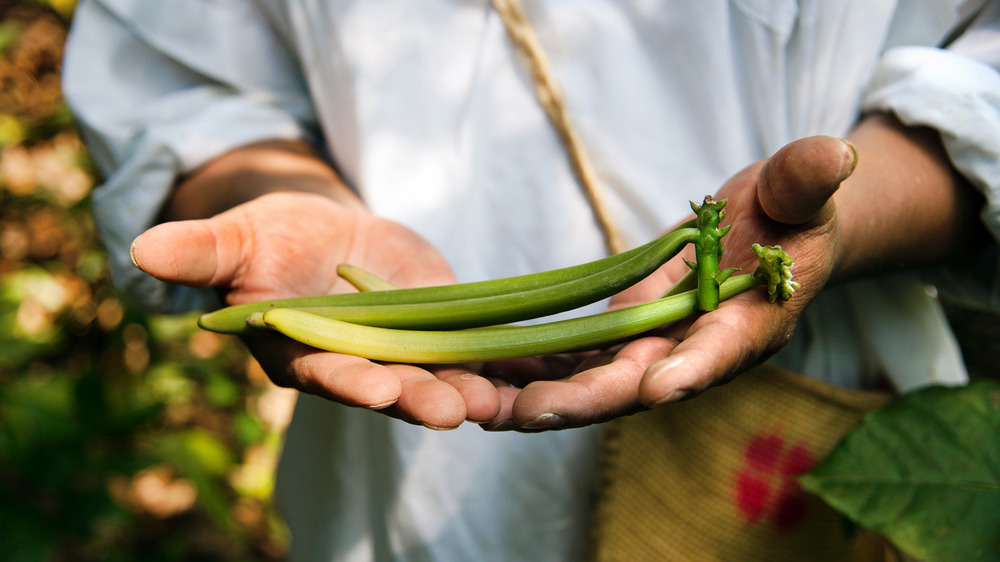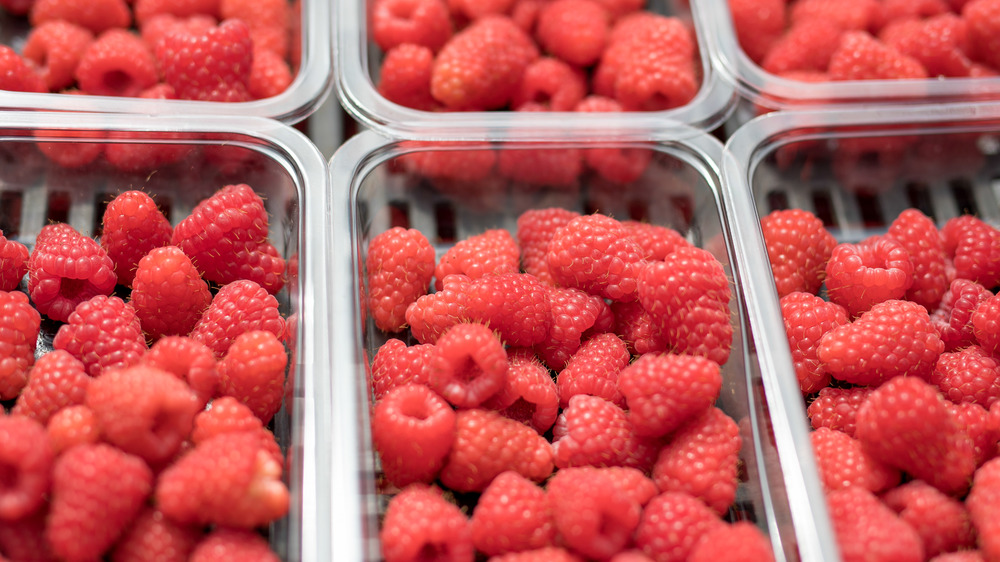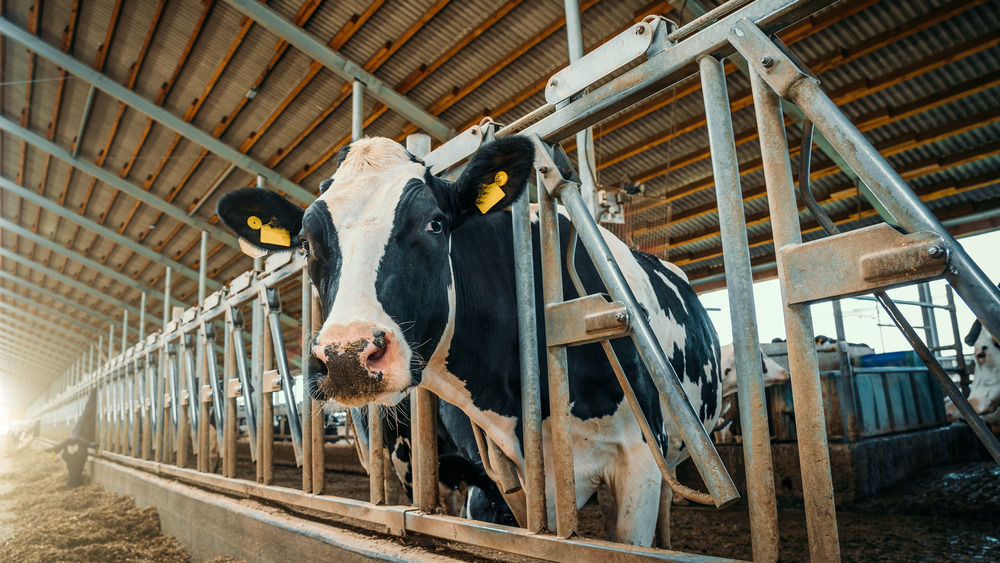The Untold Truth Of Breyers
When you walk by those long lines of black and white tubs of ice cream — the ones with the little spearmint leaf in the corner – in the freezer aisle, you may assume they're just another of the many, many brands of ice cream on the market. But Breyers is not just any ice cream brand — this is an ice cream company with a past.
Founded in the 1860s, Breyers' story stretches back to a whole other era of American history (for context, the American Civil War ended in 1865) and, for many families, Breyers has remained a part of their dessert traditions throughout the decades spanning more than a century and a half. However, just because Breyers has all that history under its belt, it doesn't mean the brand is stuck in the past.
By changing its leadership throughout its years of existence, Breyers ice cream has managed to stay relevant even up until today. These changes has meant the company has updated its product lines as trends and tastes have evolved while also remaining innovative. Today, Breyers offers a range of traditional ice creams, along with gluten-free, vegan, and other ice creams made for specialty diets and other growing markets. What exactly has Breyers done to continue to stay up-to-date for so long? You may just find the answer and more in the untold truth of Breyers.
Breyers pioneered portable ice cream
Long before ice cream trucks were roaming neighborhoods looking for hungry children, Breyers took its ice cream on the road, delivering it via horse and wagon. Right after the Civil War ended in 1865, a man named William Breyer kicked off the Breyers brand in Philadelphia. With a bit of cream, sugar, and nuts, and a fair amount of elbow grease, he started making ice cream using an old-fashioned (or, back then, standard) hand crank. He sold the ice cream to his neighbors and demand grew throughout Philadelphia, forcing Breyer to take his show on the road and begin delivering his ice cream throughout the city via horse and wagon.
By the time 1882 rolled around, Breyer had five ice cream shops in Philly along with the horse-drawn delivery side of the business. He and his family would continue on with this method for a few years, before they opened up a full wholesale manufacturing plant in 1896.
There have been quite a few Breyers owners beyond the original
While William Breyer started the Breyer empire in 1866 and then passed along the business to his son Henry in 1896, 30 years later, the Breyer ice cream name wouldn't stay in the family for long. Henry incorporated the Breyers brand in 1896, and the independent company grew to mammoth proportions. By 1918, Breyers was churning up over million gallons of ice cream a year. Breyers remained an East Coast brand, though, shipping primarily between the two major urban hubs flanking the Breyers' home base in Philadelphia — New York City to the North and Washington, D.C., to the south.
However, the Breyer family would soon cash out on William Breyer's baby and sell Breyer Ice Cream to National Dairy Products Co. in 1926. National Dairy Products was in the business of buying up other brands around the time and, soon, in 1930, bought up a little cheese business based in Chicago, known as Kraft. As a result, some time later, in 1976, National Dairy Products would come to be known as Kraft, Inc. Don't make the mistake of assuming that Breyers is now a Kraft product though: Kraft sold Breyers to Unilever in 1993, and now Breyers is part of Unilever's Good Humor-Breyers Ice Cream Company.
It might be known as an ice cream company, but Breyers isn't always selling ice cream
It looks like ice cream, it tastes like ice cream, it smells like ice cream — so it must be ice cream, right? Well, not necessarily. Some Breyers ice cream doesn't actually include enough dairy to be called "ice cream" and so it's labeled as a "frozen dessert." So, what's the deal and the difference?
According to the U.S. Food and Drug Administration(FDA) in an article on the topic in The New York Times, "Ice cream requires specific levels of milk fat content, nonfat milk solids content, total solids in each gallon of ice cream, and total weight in each gallon of ice cream, while frozen dairy products do not." In most cases, ice cream requires a minimum 10% dairy fat. As of 2013, about 60% of Breyers products were still ice cream, but that remaining 40%? They're actually frozen dairy desserts.
Can you really tell the difference? For some taste testers, not at all — until you ask them to try frozen dairy desserts and ice cream side by side. On their own, frozen dairy desserts can fool anyone and taste like you'd expect ice cream to taste, but compared to the real deal, frozen dairy desserts taste like a cheap imitation. Breyers justification for the change was that frozen dairy desserts have a smoother texture and less fat.
The Breyers mint leaf isn't really a mint leaf
That mint leaf on the Breyers carton? It's not really a mint leaf, but you'd be safe to assume it is one — after all, it looks like a mint leaf. Even the Philly History blog from the Philadelphia City Archives calls it a mint leaf when referencing Breyers ice cream parlors that were once found across the city and the Breyers signs, emblazoned with that iconic leaf, that would hang over their storefronts. Similarly, a Philadelphia Inquirer article references the mint leaf when detailing the Philadelphia Breyers factory, saying, "Its Philadelphia factory is crowned by a large billboard bearing the Breyers insignia — a green mint leaf — that can be seen from the Schuylkill Expressway and passing Amtrak trains."
But, alas, the logo is not a mint leaf. Instead, according to Ice Cream, the technical science and technology textbook on ice cream production, by H. Douglas Goff and Richard W. Hartel, the leaf is a briar leaf, which William Breyer's sons, Fred and Henry, adopted in 1896, when they opened their first ice cream manufacturing plant in Philadelphia to meet growing demand and needed some more "official" branding. It's easy to see why they went with a briar leaf (Breyer, briar, sometimes spelled "brier"... you get the idea), even though a briar leaf has nothing to do with ice cream.
There's a rumor that Breyers ice cream doesn't melt
Set out a carton of ice cream on your counter, get distracted, and accidentally forget about it? It might not be that much of a disaster. In fact, if you're expecting to come back to your kitchen with a puddle of sugary goo on the floor, that might not be the case if the ice cream in question is of the Breyers variety — or, at least that's what the rumors say.
Spoon University tested the rumor by setting two cartons of Breyers products, both the ice cream and a frozen dairy dessert, out on a kitchen counter at room temperature (73 degrees Fahrenheit). The publication found that both the ice cream and the frozen dairy dessert melted at about the same rate and, and by the end, after one hour, both products "were on their road to soup."
However, the rumor — and others like it — did spark broader questions about why and why not ice creams melt, and it turns out it's not always a question of whether or not an ice cream is "real" or a dairy dessert. Sometimes, it's just a matter of ingredients and additives, some of which are perfectly natural.
Breyers makes a range of products for specialty diets
If you're looking for an ice cream that you can enjoy while following a strict diet, you're in luck, because Breyers has you covered. Breyers makes a range of ice creams for specialty diets, including dairy-free, vegan, gluten-free, no-sugar-added, and "CarbSmart" for low-carb dieters. One of the most recent specialty lines Breyers introduced was its Breyers delights line in 2017, which offered four flavors of ice cream with low and reduced fat and more protein than you might expect in a serving of ice cream. Each pint of Breyers delights ice cream contains 260–330 calories and 20 grams of protein. Prior to that, in 2014, Breyers released gluten-free flavors, including 36 gluten-free varieties that are approved by the FDA via its gluten-free validation and labeling process. Other specialty diet ice creams from Breyers include non-GMO options and some products that are lactose-free (which, yes, is different from dairy-free; the non-dairy free ice creams are made from almond milk, whereas the lactose-free ice cream is made with dairy without lactose).
Breyers once sold this popular British ice cream dessert in the US, and it might soon make a comeback
Once upon a time, Breyers offered Americans an unfamiliar ice cream dessert that first grew to popularity in the 1980s in Great Britain: the Viennetta ice cream cake. A kind of ice cream cake with alternating vanilla ice cream and chocolate layers, the cake has been compared to a Fudgie the Whale ice cream cake and comes in a few different flavors, like chocolate and mint. However, despite its cult fandom and unique texture, Breyers couldn't quite sell all Americans on the dessert when it was offered in the 1990s, and the treat was discontinued. If you're a bit sad you missed out on this ice cream cake, though, you're in luck. Now, in 2021, Unilever is bringing the Viennetta cake back, under the Good Humor brand. For the time being, the cake is only available in the vanilla variant and in a smaller size with six servings, however considering it's only 130 calories per serving, we wouldn't blame you if you ate the entire thing yourself.
Breyers offers a delivery service to get ice cream straight to your door
Don't feel like getting up off the couch to go to the grocery store and grab some ice cream? No worries. Just like in its earlier days, Breyers has you covered with delivery services to bring ice cream directly to your door.
The Breyers "Ice Cream Shop" can be found in select locations on popular food service apps such as DoorDash, Grubhub, Uber Eats, and Postmates. But The Ice Cream Shop is not only a Breyers service. It's a Unilever initiative that stretches to include other Unilever ice cream brands, like Magnum, and is available in more than 1,500 US locations as well as under another name outside of the United States, Ice Cream Now.
According to CNN, Ice Cream Now was launched as a pilot program in London to help Unilever overcome the seasonal slump that accompanies ice cream sales, but, in 2020, the service boomed due to the COVID-19 pandemic. According to the article, "for Unilever, the growth of ice cream at home, led by brands including Ben & Jerry's and Magnum, is on track to more than offset the collapse in its out of home ice cream revenue [in 2020], which includes sales to restaurants and catering companies."
Breyers has been at the center of a false advertising lawsuit
Despite all this vanilla goodness, in 2020, a legal case was raised against Unilever stating that Breyers was falsely advertising its Natural Vanilla Ice Cream by claiming that the ice cream contains vanilla flavor exclusively derived from vanilla plants. The case said this was misleading and false advertising, as the ice cream, according to Rutgers University laboratory testing, additionally contains artificially-flavored vanilla on top of the naturally-sourced vanilla. The case further says the ice cream contains "at most, only a trace of real vanilla."
According to ClassAction.org, the plaintiff stated that if they knew about this artificially-flavored vanilla, they either wouldn't have bought the ice cream at all, or they would've expected a lower price for the ice cream. A similar case was brought up in early 2021 against Breyers' delights Vanilla Bean Low Fat Ice Cream, in which the plaintiff asked for $5 million in return for what they called "deception" that created the "reasonable belief that the vanilla bean ice cream contained vanilla beans." As of the time of publishing, a motion for dismissal for the 2020 case was denied.
Breyers supports a large number of vanilla bean farmers
On the flip side of the sustainable farming and raspberries issue, Breyers does seem to be doing good work where its vanilla beans are concerned. According to Delish, Unilever says Breyers' best-selling flavor is vanilla and that Breyers is the leading vanilla ice cream brand in North America. Breyers' natural vanilla ice cream (and, yes, the carton does say "ice cream" versus "frozen dairy dessert") uses 100% sustainably sourced natural vanilla beans from Madagascar via a partnership with Rainforest Alliance. Breyers' further commitments to its vanilla bean farmers impact approximately 4,000 farmers and their communities through initiatives like education subsidies for primary schools, health insurance for farmers, and agricultural education.
The Rainforest Alliance seal on Breyers' vanilla products is further third-party proof that when Breyers sources vanilla beans for its products, those ingredients are farmed with close attention to the environment and human rights, with support provided to help farmers improve and benefit from working with brands like Breyers.
Breyers admits that some of its ingredients are not sustainably farmed
When you're perusing a brand's website, you usually expect to see pages boasting about ingredient quality and in some cases, responsible sourcing practices. While that's what you also get, for the most part, with Breyers' own website, there's one little thing that stands out: the admission of unsustainable farming practices for one key Breyers ice cream/frozen dairy desserts ingredient. On the Breyers website ingredients pledge page, you'll see pledges to use only 100% Grade A milk and cream, naturally-sourced colors and flavors, and sustainably-sourced fruit and vanilla. But then, an asterisk points to one exception.
Turns out, the raspberries used in their products are not sustainably farmed. So what does that mean? What exactly is an unsustainably farmed raspberry? While you'll be hard-pressed to find anymore information regarding these suspicious raspberries on the Breyers website, with a little research, you can derive your own conclusions. According to the National Sustainable Agriculture Coalition, sustainable agriculture or farming is defined as, essentially, a mode of farming that protects the environment, is economically profitable, and provides social and economic equity. And according to a Slate article on sustainable crops, most raspberries don't meet these sustainable farming criteria for one big reason: pesticide use. The article states that raspberries account "for an average of 20.2 pounds of chemicals dumped on every acre of treated land." An unsustainably farmed raspberry, then, is very likely a pesticide-laden raspberry.
Breyers only sources milk from cows not treated with artificial growth hormones
In 2015, Breyers announced that it would begin sourcing milk and cream only from farmers who did not treat their cows with artificial growth hormones. The change was consistent across all Unilever ice cream brands, which also includes Good Humor, Klondike, Magnum, and Popsicle. The change was made at the same time that Breyers made its commitment to using sustainably-sourced vanilla beans. At the time of the announcement, Unilever positioned the changes as a benefit to parents, saying, "Breyers has a longstanding history of offering frozen treats with high-quality ingredients that moms feel good about. These industry-leading changes are the latest in our commitment to do right by parents and the environment."
Breyers, however, did add a disclaimer to the announcement to refine its dairy sourcing, saying that suppliers who provide ingredients that go into Breyers ice cream, such as sauces or candies, may not follow the same sourcing guidelines, but that it was basically fine because, as Breyers said, "the FDA states that no significant difference has been shown between dairy derived from rBST-treated and non-rBST treated cows."
Breyers takes its ice cream production seriously
Like most consumer brands, Breyers takes its business seriously and wants to give the people what they want (also known as, what they'll buy). And also, like most consumer brands, for Breyers, this means digging deep into what Americans do and do not enjoy when it comes to ice cream and their ice cream habits. But we're not just talking favorite ice cream flavors and ice cream toppings here (though Breyers does look into factors like that); when Breyers studies American ice cream habits, the brand gets way down into the fine details.
A recent Breyers and OnePoll study looked at how Americans like to eat their ice cream (in cups), how many toppings they like (three), and what personality traits are linked to favorite ice cream flavors. The study found that those who prefer strawberry ice cream to vanilla and chocolate are more likely to find their soul mate earlier in life, around age 24, compared to age 25 for vanilla ice cream lovers and age 26 for chocolate ice cream lovers. Additionally, the study found vanilla ice cream lovers are more introverted; chocolate ice cream lovers are more extroverted; and strawberry ice cream lovers enjoy doing their laundry.
